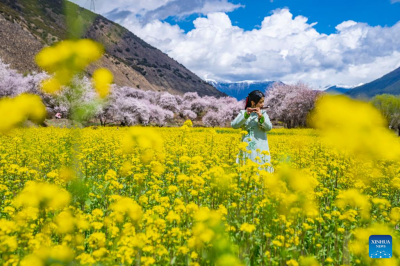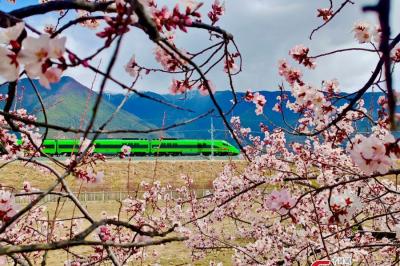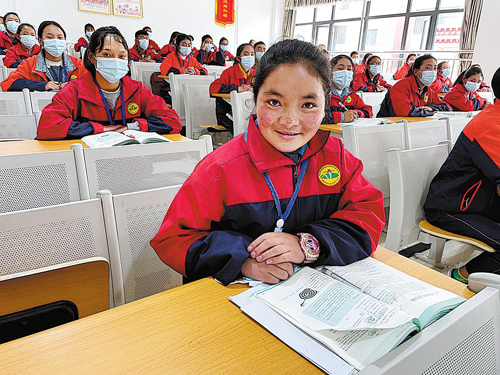 Nyima Ngodrup, 19, studies nursing at the vocational school.[Photo by Deng Zhangyu/China Daily] Editor's Note: This year marks the 70th anniversary of the peaceful liberation of Tibet. China Daily is publishing a series of stories on Tibet's journey toward prosperity.
Aug.17,2021 -- Just as dawn breaks over the grassland, Nyima Ngodrup sets out from the tent in which her family lives in Nagchu city in the Tibet autonomous region, to catch buses to a vocational school, which is about 600 kilometers away in Nagchu county. By the time she arrives, it's almost twilight.
Although it's a tough journey, involving several bus transfers, for the 19-year-old, the journey to school is leading to a different future from her mother, a herder who has raised seven children and tended hundreds of sheep and yaks.
"My mother firmly supports me in studying further. She hopes that I can have the chance to get off the plateau and see the world," says Nyima Ngodrup with a smile. Except for once visiting her elder brother, who works at a real estate agency in Lhasa, the capital city of Tibet, the girl has never left the pastures of Nagchu, one of the biggest pastoral regions in China with an average altitude of 4,500 meters above sea level.
Nyima Ngodrup is in her second year of studying nursing at Nagchu Vocational School. Next year, she is hoping to take part in one of the school's exchange projects with another vocational school in the neighboring Sichuan province, known for its pandas and spicy hot pot.
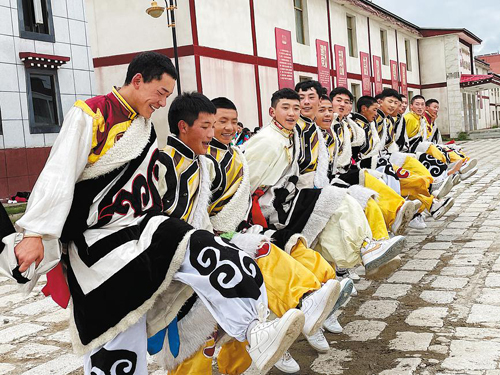 Members of an art group at Nagchu Vocational School dance on the school's playground in the Tibet autonomous region.[Photo by Deng Zhangyu/China Daily]
Boarding at the school, she will only return home during the holidays, where she helps her mother take care of their more than 200 sheep and 30 yaks. Her nomadic family is typical of the area, where locals have practiced animal husbandry for generations.
With her desire to become a nurse, Nyima Ngodrup will be just the second in her family to make a living as something other than a herder. Her elder brother, the real estate agent, will soon return from Lhasa to become a herdsman-maintaining a tradition in the area whereby the eldest son inherits the family's flock of sheep and herd of yaks. Her elder sister has married into another local family, following in their mother's footsteps to raise children and tend animals.
Nyima Ngodrup attributes the chance to change her fate to the free education system funded by the central government. Under that system, the vocational school she attends provides meals, a dormitory-even clothes to all students-and, of course, tuition.
"My mother has to support seven children. If the vocational school was not free, my family wouldn't be able to afford it," she says.
Nyima Tsering, vice-president of Nagchu Vocational School, says each student will be funded to the tune of 4,500 yuan ($695) every year to cover all their costs. The average per capita disposable income of the rural population in Tibet is 14,598 yuan, according to an official government report released on May 22.
 Students learn how to repair a computer.[Photo by Zheng Liang/For China Daily]
The school has a total of 4,145 students, offering majors in subjects, such as animal husbandry and veterinary medicine, computer science, nursing, art and design and Tibetan medicine. The number of students has been rapidly increasing in recent years and a new campus is under construction to accommodate the growing number of students.
"The concept of education to herdsmen has changed dramatically. It was not possible for them to send children to school many years ago," says the vice-president.
He recalls five years ago, when he just began his work at the vocational school, he had to organize lots of promotional activities in different counties in the nomadic area to attract students. There's no need to do that anymore.
Before the vocational school, Nyima Tsering worked as a teacher in villages around Nagchu city. He saw lots of children dropping out of school to help their family to farm and dig Chinese caterpillar fungus, a precious ingredient in Tibetan medicine that can be "more valuable than gold".
"We had to fight with herders to pull their children back to school," jokes Nyima Tsering. He says the reason many people didn't send their children to school was partly influenced by their outdated opinion on education and partly due to their poor economic situation.
"The dropout rate has decreased considerably since a special free education system began in Tibet in 2012," he adds.
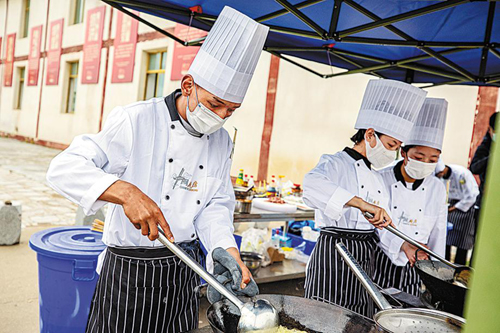 Students in the same school take a cooking class.[Photo by Zheng Liang/For China Daily]
In 1985, the region's government started to provide free education system for nomadic and rural families. The system provides 15 years of free education (including tuition, meals and accommodation), from kindergarten to high school (or vocational school). In 2012, the policy was extended to all residents.
According to the region's education department, more than 20 billion yuan has been invested in the policy since 1985, benefiting 8.93 million students.
With the wider adoption of the internet on the plateau, the younger generations are eager to strike out and forge their own path, unlike their parent's generation who preferred to stay back, says Nyima Tsering. The free education policy has increased their willingness to study.
Tsomo, an 18-year-old who is in her third year at Nagchu Vocational School, plans to take an entry examination to college next year. She is majoring in animal husbandry and veterinary medicine, a popular subject in the school, given the area's reliance on livestock.
Tsomo's family lives about 100 kilometers away from the school and owns 50 yaks and 50 sheep. They live in a house provided by the local government instead of in a traditional tent on the grassland.
Tsomo is the eldest among the four children. Since she was a little girl, she was interested in watching the vet treating yaks and sheep.
Her father works in Nagchu county and all the animals are tended by her mother.
"The farm work is really hard for my mother. I hope I can help her after I complete my study in college," she says.
She says her parents asked her to do her best with her course since they don't have to bear the economic burden thanks to the free education policy. They hope that their daughter can go to a city instead of staying on the plateau.
Tsomo has learned a lot about city life through the internet, which she accesses with her cellphone. She has never had the chance to leave Nagchu city and is curious about cities outside the region.
Because of her hard work, Tsomo gets good marks in her classes and it is possible for her to go to South China's Guangzhou province to further her study, according to vice-president Nyima Tsering.
"The government keeps investing heavily in education in the region. I think in the future, the gap between our students and those in cities outside Tibet will become smaller," he says, adding that many of his students are shy and lack self-confidence. He says the situation will change with more families availing themselves of education.
By:Deng Zhangyu
|
- Home
- News Tibet |Exclusive |China |World |Related News |Latest
- Documents White Papers |Others
- Photo Politics |Economy & Society |Culture & Religion |Human & Nature |Beautiful Tibet |Other Tibetan-Inhabited Area |Exchanges |Related
- Video News |Documentary |Micro-Video |Entertainment
- Art
- Tourism
- In Focus
- About Tibet


